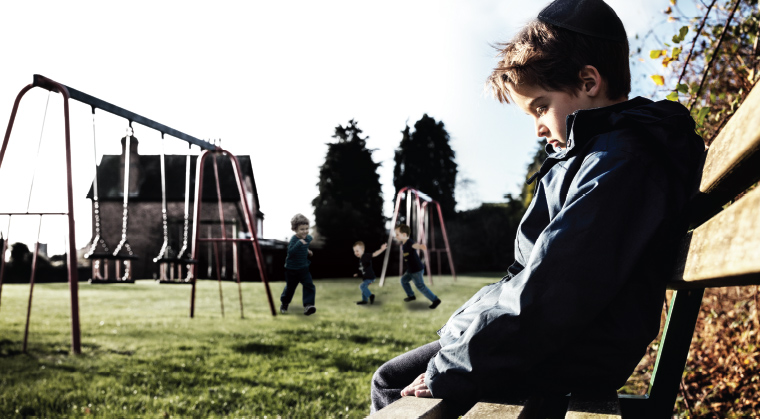The Odd One Out


When I started sending my four-year-old son to a school outside of our neighborhood, I didn’t anticipate the social challenges he’d experience as a result.
Just months after the switch, I took Avraham to a local park where all of his old friends from the block were playing. By then, these boys were a tight-knit group of classroom buddies. Sitting on the park bench, I watched as Avraham tried, in vain, to win his old friends over. When he joined their conversation, they responded with disinterest. When he tried to garner attention with his giddy antics — as kids his age tend to do — his old friends looked away.
I watched as he followed them around, and I watched as they walked away from him. My heart broke, and my eyes teared up. I knew intervening would’ve been awkward for everyone. I sat there feeling powerless, wishing I knew how to best help him.
What should we do when a child is struggling socially? Should we intervene if we find out that our daughter sometimes sits alone at recess? Should we start calling around for playdates if no one is calling our son? Should we seek professional help if we see our daughter missing social cues? What is a parent’s role in this situation?
What’s the Problem?
According to Milwaukee school psychologist Faygie Hellman, the very first question we should ask ourselves is this: Is there actually a real problem?
Let’s say, for instance, that you get a niggling feeling that something isn’t right socially for your child at school. Faygie points out that even if you’re uncomfortable, it doesn’t necessarily indicate a serious issue. “First, try to discern whether it’s your child’s problem — or your own,” she says.
What’s perceived as a social problem might just be a personality difference between a parent and her child, as is sometimes the case with extroverted parents of introverted children. Even if you’re disturbed by the fact that your introverted child feels drained by social situations or doesn’t love going to school parties, it doesn’t necessarily mean that something is wrong.
If a child is content and doesn’t appear anxious or unhappy, then maybe it’s time to rethink the issue and ask the critical question: “Does my child appear stressed?”
It might also be worthwhile to talk over your concerns with a friend or another objective adult. “As parents, we often project,” says Faygie. “We either want to give our children more than we had as children, or we fall into the trap of projecting our own childhood onto our kids.” If, growing up, you had a challenging social life, it can be difficult to not transfer those feelings of insecurity and unease onto your own children.
Ruchama, for example, remembers the raw pain she experienced after moving to a new town as a child and the difficult social adjustments that followed. Now, decades later, it gnaws at her that her daughter Goldie has limited social interest. Although Goldie has a small circle of friends, she generally avoids social gatherings. Does Ruchama’s unease indicate a real problem? Or, is her perception of the situation creating or exacerbating it? In these situations, a friend or even a professional can help us gain a clearer perspective of the situation.
(Excerpted from Family First, Issue 632)
Oops! We could not locate your form.













